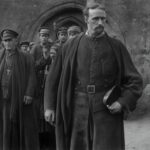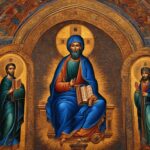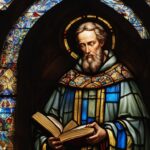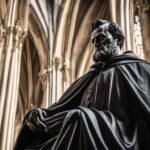St. Cuthbert, a monk and bishop of Lindisfarne, is a figure of great historical significance and spiritual inspiration. Born in the 7th century during a time of religious change in England, St. Cuthbert embraced a life of devotion and service to God. His journey from humble beginnings to becoming a revered saint is a testament to his unwavering faith and profound impact on the lives of others.
Early Life and Background:
Little is known about St. Cuthbert’s early life, but he grew up during a period of religious tension between Roman and Irish traditions. The Synod of Whitby in 664 resolved this dispute in favor of the Roman church, a decision that would shape Cuthbert’s path.
Call to Religious Life:
Feeling called to a spiritual vocation, Cuthbert became a monk and embarked on a journey of self-discovery and devotion to God. He joined the Celtic monastery at Melrose before moving to Lindisfarne, where he would later serve as Prior and Bishop.
Work:
During his time as Bishop of Lindisfarne, St. Cuthbert carried out various responsibilities, overseeing the spiritual well-being of the community and spreading the teachings of Christianity. His dedication to the church and selfless service to the people of Northumbria left a lasting impact.
Spiritual Life and Philosophy:
St. Cuthbert’s spirituality was rooted in prayer, contemplation, and a deep desire to maintain a close relationship with God. He embraced an ascetic lifestyle, exemplifying humility, simplicity, and inner peace in his pursuit of holiness.
Challenges and Criticisms:
Despite his revered status, St. Cuthbert faced challenges and criticism during his life. Some found fault with his strict ascetic practices, while others questioned his commitment to the Roman church. However, Cuthbert remained steadfast in his faith and commitment to his spiritual path.
Recognition and Awards:
St. Cuthbert’s dedication and contributions to the church earned him recognition and acclaim. He was highly revered as a spiritual leader and role model, with a reputation for miracles and a profound influence in the lives of those around him.
Miracles and Path to Sainthood:
Throughout his life and after his death, St. Cuthbert was associated with numerous miracles. His relics became precious objects, and people flocked to his shrine seeking divine intervention. These miracles ultimately led to his canonization and recognition as a saint.
Legacy and Continuing Influence:
St. Cuthbert’s legacy lives on, inspiring individuals to deepen their spiritual journey and seek a closer relationship with the divine. His shrine at Durham Cathedral continues to attract pilgrims from around the world, offering a place of connection and devotion.
Reflections and Personal Testimonies:
Many individuals have shared personal stories of how St. Cuthbert’s life and teachings have impacted their own spiritual journeys. These reflections highlight the transformative power of faith and the timeless relevance of his message in the modern world.
Key Takeaways:
- St. Cuthbert, a monk and bishop during the medieval period, exemplified unwavering faith and dedication to God.
- His early life was shaped by religious tensions between Roman and Irish traditions, culminating in the Synod of Whitby’s resolution in favor of the Roman church.
- Cuthbert’s call to religious life led him to become a monk and eventually serve as Prior and Bishop of Lindisfarne.
- He played a significant role in the administration of the church, evangelization efforts, and pastoral care for the people of Northumbria.
- St. Cuthbert’s spirituality emphasized prayer, contemplation, humility, and the pursuit of inner peace.
Early Life and Background
The early life of St. Cuthbert, born around 635, remains shrouded in mystery. While limited information exists about his upbringing, it is believed that he received an education within the Irish tradition. Growing up during a time of significant religious transformation in England, Cuthbert witnessed the clash between the Roman and Irish traditions. Christianity had recently spread to England in the 6th century, and these two traditions often differed in their practices.
The Synod of Whitby in 664 played a crucial role in resolving the dispute between the Roman and Irish traditions. This synod favored the Roman church, and St. Cuthbert accepted its verdict. This event marked a significant turning point in Cuthbert’s early life, shaping his future as he embarked on a path of devotion and faith.

St. Cuthbert’s early life and background set the stage for his later accomplishments and profound spiritual journey. Despite the limited knowledge about his upbringing, it is in these formative years that the seeds of his spirituality and commitment to God were planted.
Call to Religious Life
From a young age, St. Cuthbert felt a deep inner calling to dedicate his life to religious devotion. Embracing this calling, he made the decision to become a monk. Taking his first steps on the path of spiritual enlightenment, Cuthbert joined the Celtic monastery at Melrose, where he embarked on a transformative journey of faith.
Immersed in the monastic environment, Cuthbert found solace and purpose in the pursuit of divine communion. He embraced the monastic lifestyle with unwavering commitment, immersing himself in prayer, contemplation, and the worship of God. Time spent in the sanctuary of the monastery nurtured his soul, allowing his spiritual connection to flourish.
Seeking further spiritual growth, Cuthbert later moved to the monastery at Lindisfarne, where he would go on to become Prior and eventually Bishop. This shift in institutions marked a pivotal chapter in his religious journey, enabling him to fulfill his spiritual duties on a larger scale and guide others on their own paths to God.
Throughout his monastic life, St. Cuthbert exemplified the core principles of devotion and self-sacrifice. His commitment to prayer and contemplation served as an inspiration to his fellow monks and a testament to the transformative power of a life dedicated to spiritual pursuits.

St. Cuthbert’s call to religious life allowed him to fulfill his deep yearning for spiritual connection, providing him with the platform to lead others on their own paths to spiritual enlightenment. Through his unwavering devotion to God, Cuthbert became a beacon of faith, offering guidance and inspiration to all who sought the divine.
Work
As Bishop of Lindisfarne, St. Cuthbert carried out various duties and responsibilities, making significant contributions to the church and the community. Here are some highlights of his work:
- Administration of the Church: St. Cuthbert played a crucial role in the administrative functions of the church. He ensured the smooth operation of the monastic community and supervised the activities and welfare of the clergy.
- Spiritual Guidance: With his deep understanding of the Christian faith and devotion to God, St. Cuthbert provided spiritual guidance and support to the monastic community, guiding them in their religious practices and fostering their spiritual growth.
- Pastoral Care: Recognizing the importance of caring for the people of Northumbria, St. Cuthbert dedicated himself to providing pastoral care to the local population. He offered counseling, conducted religious services, and ministered to those in need, offering solace and support.
- Evangelization Efforts: St. Cuthbert actively engaged in spreading the teachings of Christianity and worked tirelessly to convert others to the faith. His commitment to evangelization endeavored to bring more people to the knowledge of God’s love and to share the message of salvation.
St. Cuthbert’s work as a Bishop exemplified his dedication to the church, his unwavering faith, and his mission to serve and guide others in their spiritual journeys.

| Contributions | Achievements |
|---|---|
| Administration of the Church | Ensured smooth operation of the monastic community and supervised clergy |
| Spiritual Guidance | Provided guidance and support to the monastic community in their religious practices |
| Pastoral Care | Offered counseling, conducted religious services, and ministered to those in need |
| Evangelization Efforts | Active engagement in spreading the teachings of Christianity and working to convert others to the faith |
Spiritual Life and Philosophy
St. Cuthbert was a beacon of spirituality, renowned for his deep devotion to God and his unwavering commitment to a life of prayer and contemplation. His spiritual journey was guided by a profound desire to cultivate a closer relationship with the divine and seek inner peace.
“To know God deeply, one must first know oneself,” St. Cuthbert often reflected. He embraced a strict ascetic lifestyle, practicing self-discipline and self-denial as a means to focus on his spiritual growth. By renouncing worldly pleasures and dedicating himself to a life of simplicity, humility, and fervent prayer, St. Cuthbert sought to strip away distractions and connect more intimately with the divine presence.
St. Cuthbert’s philosophy emphasized the importance of humility as the foundation of true spirituality. He believed that by humbling oneself before God and recognizing one’s own limitations, one becomes open to receiving divine grace and guidance. This humility, combined with a sincere desire for spiritual growth, allowed St. Cuthbert to embark on a transformative journey towards deeper spiritual understanding.
“Simplicity is the key to inner peace,”
Simplicity was another cornerstone of St. Cuthbert’s spiritual philosophy. He believed that living a simple and uncluttered life allowed for greater focus on the spiritual realm, unburdened by the distractions and complexities of the material world. By embracing a life of simplicity, St. Cuthbert found solace in the pursuit of spiritual truth and the fulfillment of his calling.
St. Cuthbert’s unwavering commitment to his spiritual path was a source of inspiration and guidance for others seeking a deeper connection with the divine. His teachings resonated with many, as they embodied the essence of true spirituality — an unwavering faith, a humble heart, and a steadfast dedication to the pursuit of inner peace and spiritual enlightenment.
St. Cuthbert’s spirituality continues to be a source of inspiration and guidance for individuals on their own spiritual journeys today. His philosophy serves as a reminder that by prioritizing a life of prayer, contemplation, and simplicity, one can unlock the profound depths of the divine and experience a transformative connection with God.
Challenges and Criticisms
Even though St. Cuthbert was held in high esteem, he encountered his fair share of challenges and criticisms throughout his life. Some individuals accused him of being excessively strict in his ascetic practices, perceiving him as lacking compassion for those in need. These critics believed that he placed too much emphasis on personal discipline at the expense of extending mercy and care to others.
Additionally, there were those who questioned St. Cuthbert’s dedication to the Roman church and its practices. The ongoing tensions between the Roman and Irish traditions fueled skepticism about his allegiance. However, undeterred by such uncertainties, Cuthbert remained resolute in his unwavering faith and commitment to his spiritual path.
“Do not be swayed by doubts and criticisms,” St. Cuthbert once proclaimed. “Stay true to the calling of your heart and the guidance of the divine, for it is there that true spiritual transformation lies.”
Despite the challenges and criticisms he faced, St. Cuthbert’s unyielding dedication to his beliefs eventually solidified his enduring legacy as a beacon of medieval spirituality. His unwavering commitment to his spiritual journey serves as an inspiration to all who seek a deeper connection with the divine, reminding us to remain steadfast in our own paths, even in the face of adversity.

Recognition and Awards
St. Cuthbert’s unwavering dedication and profound impact on the church earned him widespread recognition and numerous prestigious awards. He was highly revered by his contemporaries, who regarded him as a spiritual leader and a revered role model. Cuthbert’s immense influence on the spiritual lives of others led to him being hailed as a paragon of virtue and piety.
Throughout his lifetime, St. Cuthbert was considered a saint, revered for his exceptional devotion and unwavering faith. His extraordinary reputation for performing miracles further solidified his stature as a revered figure within the church and among the faithful.
“St. Cuthbert’s steadfast commitment to his spiritual path and his miraculous acts demonstrated his unwavering faith and his profound devotion to God. His extraordinary achievements earned him esteemed recognition and the admiration of countless individuals.”
As a testament to his extraordinary contributions, St. Cuthbert’s veneration continued even after his death. His name became synonymous with spiritual excellence and he was posthumously elevated to the status of a saint. His shrine at Durham Cathedral became a place of pilgrimage and devotion, attracting believers from far and wide.
The awe-inspiring legacy of St. Cuthbert, coupled with the recognition bestowed upon him, serves as a testament to the indelible mark he left on the hearts and minds of countless individuals. His influence continues to inspire generations, guiding them on their own spiritual journeys.

Miracles and Path to Sainthood
St. Cuthbert was renowned for the numerous miracles associated with his life and legacy. These miracles, both during his time on earth and after his death, were awe-inspiring and served as a testament to his holiness. They included remarkable healings, extraordinary visions, and the supernatural preservation of his body.
The cult of St. Cuthbert flourished as news of these miracles spread far and wide. People from all walks of life flocked to his shrine, seeking his intercession and hoping to experience the transformative power of his relics. The faithful believed that St. Cuthbert’s divine connection could bring about miraculous outcomes in their own lives.
“The healing power of St. Cuthbert is truly remarkable. I witnessed an incredible transformation when a young child, suffering from a severe illness, was brought to his shrine. After fervently praying and touching the relics, the child made a miraculous recovery, leaving the doctors astonished.”
– Elizabeth, a pilgrim
The fervent devotion and unwavering faith of the pilgrims who sought St. Cuthbert’s intercession eventually led to his path to sainthood. The Catholic Church recognized his holiness and canonized him as a saint, acknowledging his extraordinary life and the undeniable miracles associated with his name.
Legacy and Continuing Influence
St. Cuthbert’s legacy is a testament to his unwavering devotion and profound impact on spiritual journeys. His life and teachings continue to inspire and influence individuals seeking a deeper connection with the divine. Through his unwavering commitment to God, ascetic lifestyle, and dedication to prayer and contemplation, St. Cuthbert exemplified the virtues of faith, humility, and inner peace.
His influence extends beyond his time, and the shrine of St. Cuthbert at Durham Cathedral stands as a sacred place of pilgrimage and devotion. Visitors from around the world are drawn to this hallowed site, seeking solace, guidance, and a glimpse into the spiritual path forged by St. Cuthbert.
Through the centuries, St. Cuthbert’s enduring influence has transcended geographical and cultural boundaries. He continues to inspire people to embrace a life of spiritual depth, virtue, and compassion. His teachings serve as beacons of hope, guiding individuals on their own spiritual journeys.
| Legacy of St. Cuthbert | Continuing Influence |
|---|---|
| Insights and Lessons for Spiritual Seekers | Representation in Art, Literature, and Music |
| Pilgrimage and Devotion at Durham Cathedral | Spiritual Retreats and Retreat Centers |
| Inspiration for Monastic and Religious Communities | Recognition and Commemoration |
“St. Cuthbert’s influence is not limited to the pages of history but continues to shape the spiritual landscape of today. His enduring legacy calls us to embrace a life of devotion, humility, and inner peace.”
Reflections and Personal Testimonies
The inspiring life and remarkable achievements of St. Cuthbert have had a profound impact on individuals and communities alike. Countless individuals have shared their personal reflections and testimonies, vividly recounting how St. Cuthbert’s spirituality has deeply touched their lives.
These heartfelt stories serve as poignant reminders of the enduring power of faith. They bear witness to the transformative influence of divine grace, as individuals testify to the profound positive changes that have occurred in their lives as a result of connecting with St. Cuthbert’s teachings.
St. Cuthbert’s message and example continue to resonate strongly in the modern world, demonstrating the enduring power of his spiritual wisdom. Through the personal testimonies of numerous individuals, we are reminded that St. Cuthbert’s timeless message of faith, humility, and inner peace still holds immense relevance today.
FAQ
Who was St. Cuthbert?
St. Cuthbert (c.635-687) was an early Christian monk who became Prior and Bishop of Lindisfarne. He played a significant role in the religious changes in England during his time.
What were the early years of St. Cuthbert’s life like?
Little is known about St. Cuthbert’s early life. He was likely educated in the Irish tradition and lived during a time of religious change in England.
What led St. Cuthbert to a religious life?
St. Cuthbert felt a calling to religious life and became a monk at an early age. He joined the Celtic monastery at Melrose, where he began his spiritual journey.
What were St. Cuthbert’s main contributions and responsibilities as Bishop of Lindisfarne?
As Bishop of Lindisfarne, St. Cuthbert carried out various duties, including overseeing the church’s administration, providing pastoral care, and playing a role in evangelization efforts.
What was St. Cuthbert’s spiritual philosophy?
St. Cuthbert followed a strict ascetic lifestyle, practicing self-discipline and self-denial. His philosophy emphasized humility, simplicity, and the pursuit of inner peace.
Did St. Cuthbert face any challenges or criticisms?
St. Cuthbert faced challenges and criticisms throughout his life. Some accused him of being too strict in his ascetic practices and questioned his adherence to the Roman church.
How was St. Cuthbert recognized for his contributions?
St. Cuthbert was highly revered by his contemporaries and viewed as a spiritual leader and role model. He was considered a saint even during his lifetime.
What miracles are attributed to St. Cuthbert?
Numerous miracles were attributed to St. Cuthbert, including healings, visions, and the supernatural preservation of his body. These miracles contributed to his canonization and recognition as a saint.
What is the legacy of St. Cuthbert?
St. Cuthbert’s legacy endures, inspiring and influencing spiritual journeys. His devotion to God, ascetic lifestyle, and commitment to prayer continue to serve as examples.
Can you share any personal reflections or testimonies about St. Cuthbert?
Many individuals have shared personal reflections and testimonies about how St. Cuthbert’s spirituality has touched their lives, highlighting the transformative power of faith and divine grace.
















